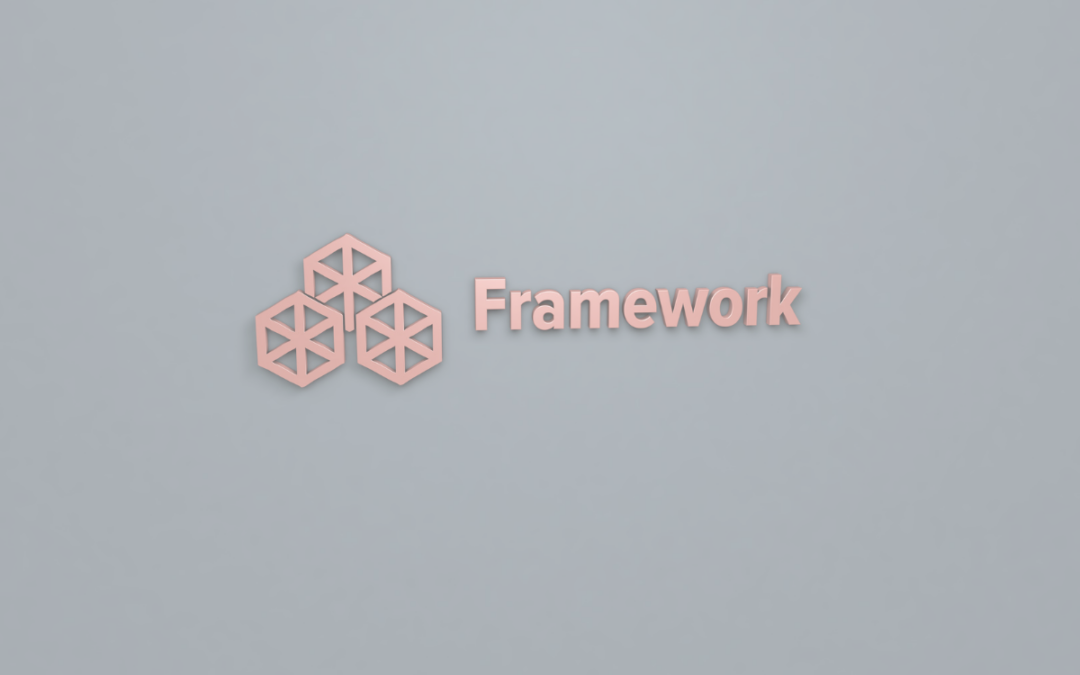
by Clair Mooney | 1 Jul, 2025 | Drylining, Skills
FIS has been working with members to develop the competency frameworks for Drylining and Plastering, which are now available for a 30-day online review and feedback period (30 June to 29 July 2025).
We would encourage members to provide feedback and comments, as these frameworks define the Skills, Knowledge, Experience, and Behaviours essential for the trade.
Link to the consultations can be found here:
Drylining – citb.welcomesyourfeedback.net/s/AJ25_2DL
Fibrous Plastering – citb.welcomesyourfeedback.net/s/AJ25_3FB
There are also webinars, which CITB will host to go through the frameworks and how they have been developed, links to these can be found below:
Fibrous Plastering 15 July 2025, 2pm – https://www.eventbrite.co.uk/e/1423415206199?aff=oddtdtcreator
Drylining webinar 16 July 2025, 2pm https://www.eventbrite.co.uk/e/1431668612359?aff=oddtdtcreator
For more information on the Competence Frameworks click here
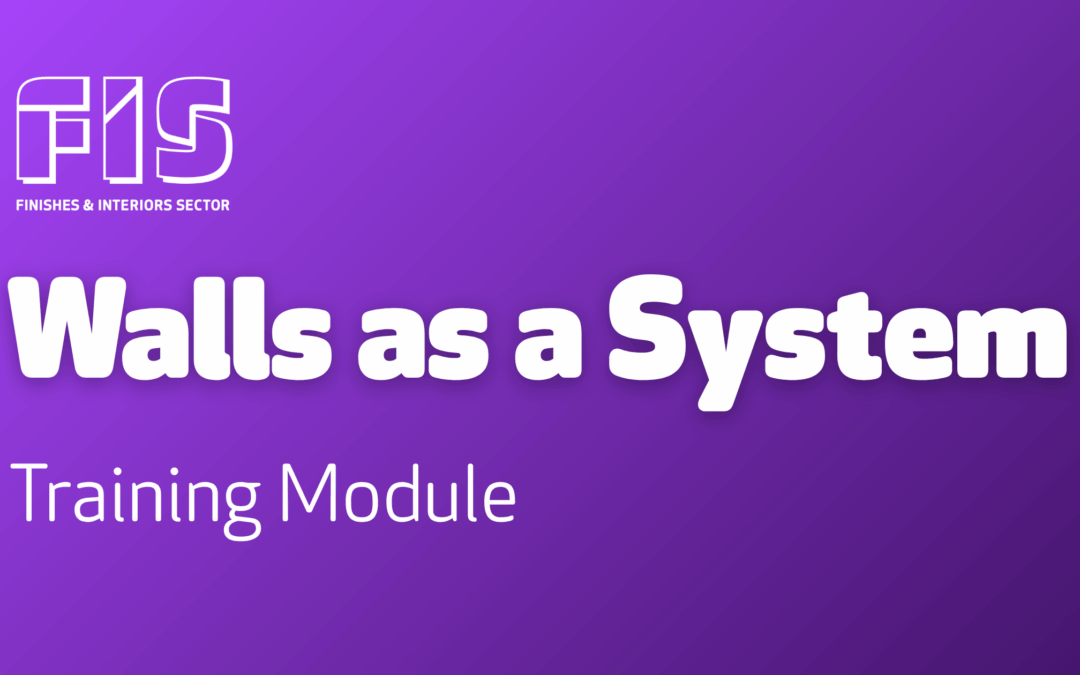
by Oscar Venus | 26 Jun, 2025 | Drylining, Skills
The Finishes and Interiors Sector (FIS) has launched a new online training module based on its industry-recognised guidance Walls as a System. Designed to support specifiers, designers, contractors, and building owners, the module promotes a holistic approach to wall system design and installation, helping to ensure compliance and compatibility across components.
Modern construction often sees building elements such as partitions, glazing, and doors specified in isolation, which can lead to performance failures and compliance issues. This training tackles that challenge head-on by focusing on how these components interact and perform together as part of a single, integrated system.
The training supports the key principles of the Building Safety Act and aligns with the RIBA Plan of Work. It covers essential topics such as:
-
Ensuring fire and acoustic compatibility across wall systems
-
Managing interfaces and penetrations
-
Clarifying the term ‘fire wall’ and its function
-
Working with raised access floors and glazed fire walls
-
Understanding imposed load support and detailing
-
Navigating standards and responsibilities at every project stage
Developed in collaboration with technical experts and peer-reviewed by leading organisations including ASDMA, DHF, GIRI, GAI, GPDA and PFKG, this training offers practical, relevant insight into best practices for wall design in the finishes and interiors sector.
The Walls as a System module is now available on the FIS Training Portal and is free to access for FIS members.
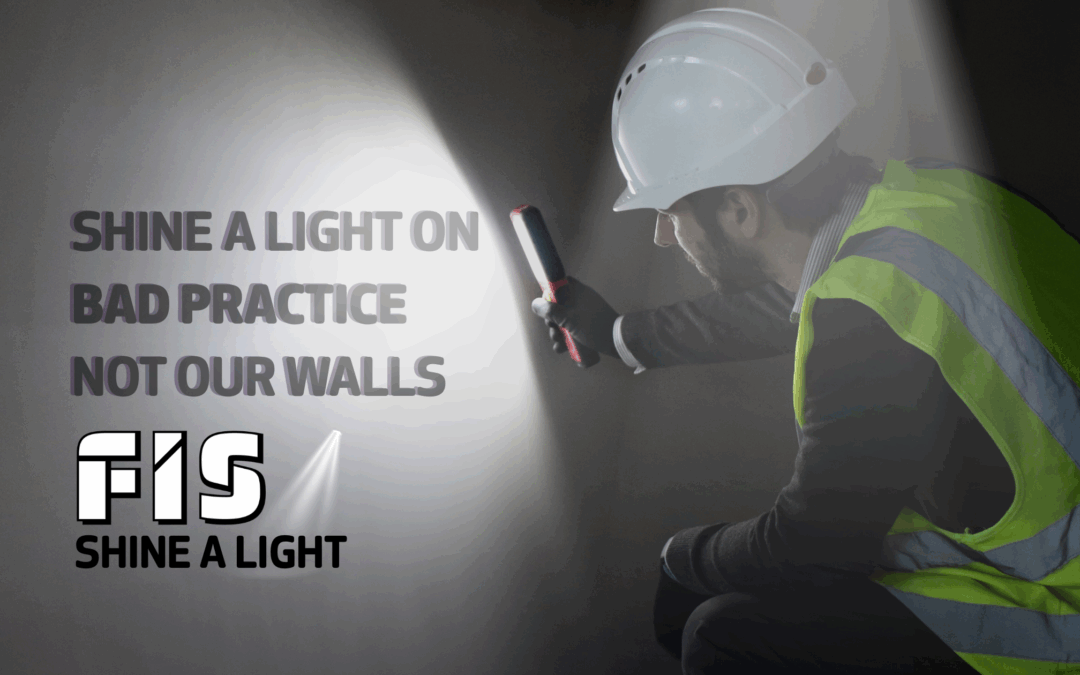
by Oscar Venus | 20 Jun, 2025 | Contractual and Legal, Drylining, Insurance
Finishes and Interiors Sector (FIS) is taking a stand against poor behaviour in the supply chain. Members working in the housebuilding sector have raised concerns about unfair snagging practices on plaster or tape and jointed walls where LED lights are being used at shallow angles to inspect the finish.
This improper practice whereby the light is shined close to, or directly against the surface of the wall, highlights surface imperfections which are normally imperceptible to the human eye well within tolerance when industry-standard inspection methods are used.
On launching the campaign, Iain McIlwee, FIS Chief Executive stated: “We often talk about the culture of construction and that means we need to look at all behaviours and the effect they have. It is clear to us that this over-zealous approach to inspection is creating a lot of bad feeling and straining relationships. Our belief is that the practice has little to do with quality and everything to do with keeping pressure on the supply chain, making sure sub-contractors are operating under commercial tension. In the worst of cases it is being used to delay, reduce or withhold payment and with that all the cashflow and mental health issues that plague SMEs in the supply chain. Sometimes problems can be put down to people not understanding the standards and techniques, but in reality, it is often little more than bullying behaviours and has no place in the sector today.”
To tackle the problem head-on, FIS has published new guidance which members are encouraged to download and share with their clients ahead of starting work. This guidance covers how inspections should be conducted and encourages the classification of the flatness of the plastered finish is agreed along with the level of smooth finishes before work starts.
FIS Head of Technical James Parlour said: “Over the years we’ve tried attacking this problem from purely a technical perspective, but frustratingly people continue to ignore the standards. Change won’t happen unless we put our heads above the parapet and start to call out bad behaviour. This latest guidance and supporting resources should help align expectations and inspections to the standards and ensure that we avoid glancing light issues in inspection which exaggerate even the smallest of imperfections.
We do appreciate that it can be difficult for individual members to do this directly, but we are also asking members to report to us when they encounter these bad practices and we can pick it up as a collective effort.
So the message is clear, if you are inspecting drylining and plaster finishes, refer to the standards and ensure that your processes are informed, fair and realistic. If you are a specialist contractor and have experienced unfair snagging practices, don’t just put up with it and move on reach out to us in confidence so we can log cases and start to challenge businesses to improve”.
Beyond site tension FIS is also concerned the effect bad practices have on those looking to start a career in the sector. Young people are being encouraged into the industry but when they are faced with this culture and ruthless nature many leave before they have had chance to really see what a good career the construction industry can offer. We need to create a better culture on site to attract and retain the people we need.
To support the campaign FIS will be launching a short video to help showcase the problem and is develop new training to support inspections. You can register on the FIS website to receive free access to the training when it is launched later this summer.
For more information and to keep an eye on developments visit the FIS Shine a Light Campaign page here.
To report your experiences, email details in confidence to info@thefis.org or call 0121 707 0077.
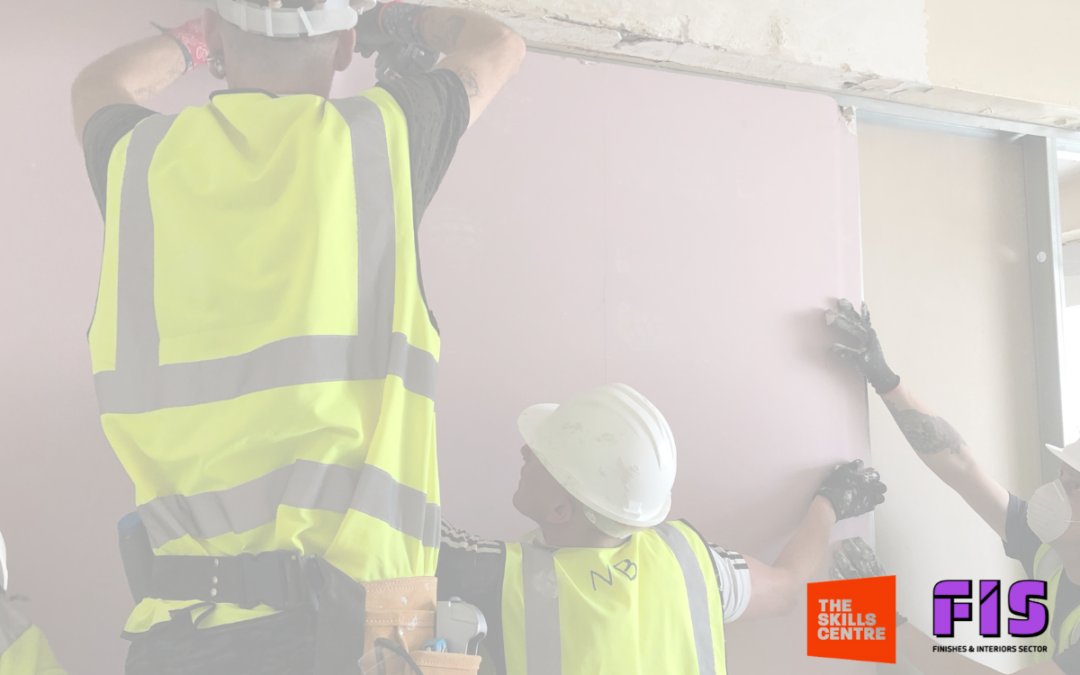
by Clair Mooney | 14 Feb, 2025 | Drylining, Employment, Skills
Construction training provider, The Skills Centre has launched a cutting-edge apprenticeship scheme specialising in drylining.
Designed in collaboration with employers and endorsed by FIS, this specialist training programme will launch in March at The Skills Centre’s new green skills training facility in Edgware, run in partnership with Ballymore, Places for London and Barnet Council. The programme will then expand to The Skills Centre’s Build East facility at The Queen Elizabeth Olympic Park and into a new custom facility in Essex later this year.
With demand for new housing, the need to upgrade buildings across the UK to help optimise space and deliver net-zero emissions by 2050, demand for interior systems, insulation and retrofit skills is surging. Yet, the industry faces a critical shortage of trained professionals. Our new interior systems and drylining apprenticeship will help bridge this gap by equipping learners with some of the essential skills required to meet these targets. An estimated 3.4 million properties in London alone require retrofitting, and with 78% of construction employers reporting retrofit skills shortages, this training is timely and essential.
The drylining apprenticeship training will cover:
- Partition Walls
- MF Ceilings
- Grid Ceilings
- Shaft Walls
- Metsec Installation
- Rainscreen Cladding
- Passive Fire Protection
Apprentices will gain additional qualifications in:
- NVQ L2 Interior Systems
- PASMA
- CSCS
- SSSTS (if eligible)
This apprenticeship is open to those seeking to build a successful career within the construction sector, providing the skills, knowledge, and behaviours necessary to establish a strong foundation in the industry.
Supporting employer recruitment: To assist employers with recruitment, The Skills Centre offers 8-week interior systems bootcamps for new entrants. These bootcamps provide a mix of classroom and practical training, including CSCS Green Card, and allow employers to meet pre-screened candidates and conduct two-week trial placements before committing to an apprenticeship hire. This provides companies with access to a pipeline of engaged, local candidates equipped with the relevant skills to excel in the apprenticeship programme from day 1.
Jon Howlin, CEO of The Skills Centre, said:
“Recruiting quality candidates has been a significant challenge for many in the construction industry. Our apprenticeship and bootcamp programmes are designed to alleviate this by providing a vital pipeline of skilled, local talent ready to meet the industry’s evolving demands.
“The Skills Centre is committed to collaborating with employers and construction companies to ensure that local people have access to opportunities in the industry and that our partners receive the skilled workforce they need for their projects.”
While the Interior Systems Apprenticeship is a new addition to The Skills Centre’s delivery, they have been providing apprenticeships in Groundwork, Formwork, Steel Fixing and Highways Maintenance for several years, and recently received a Good overall grade from OFSTED with Outstanding marks for Adult Education Provisions.
FIS CEO Iain McIlwee added:
“Employers want people, people want jobs that allow them to earn and develop and government want a productive workforce, yet we seem to make it complicated and consistently fail to meet the expectations of each other.
“It is refreshing to be working so closely with The Skills Centre to rethink the way that we put it all together and deliver a programme that can work for everyone. Flexible, practical and quality provision, tailored to employer need in an environment that supports the individuals is what this is all about. Plugging in the Bootcamps makes sense too, it means employers and individuals can start the process, help people get productive early and ensure that we are investing in the people that want to and will be able to carve a career out in our industry with full knowledge of what that is before the serious investment starts. The next 5 years is going to see major reform of the apprenticeship model and this is a fabulous way to kick that off in the finishes and interiors sector”.
The Skills Centre are working with a number of employers to support both the Bootcamp and the Apprenticeship, including Measom, one of the leading Drywall Contractors in the UK and an integral part of the construction industry.
Rikki Wild, Training Manager at Measom said,
“Creating clear and accessible entry points into the dry lining industry is crucial for its long-term success, and this programme achieves just that. By combining intensive bootcamps with structured apprenticeships, we are offering a comprehensive pathway for new talent to enter the sector, providing them with the essential skills and knowledge from the very start. At Measom, we recognise the great value of practical, employer-led training that ensures apprentices are fully prepared and confident when working on-site. This initiative plays a key role in helping employers like us develop a highly skilled, adaptable, and sustainable workforce, which is vital to meeting the future needs and challenges of the industry.”
To learn more about this apprenticeship opportunity or to apply, visit https://theskillscentre.co.uk/courses-services/interior-systems-installer-dry-lining-apprenticeships.
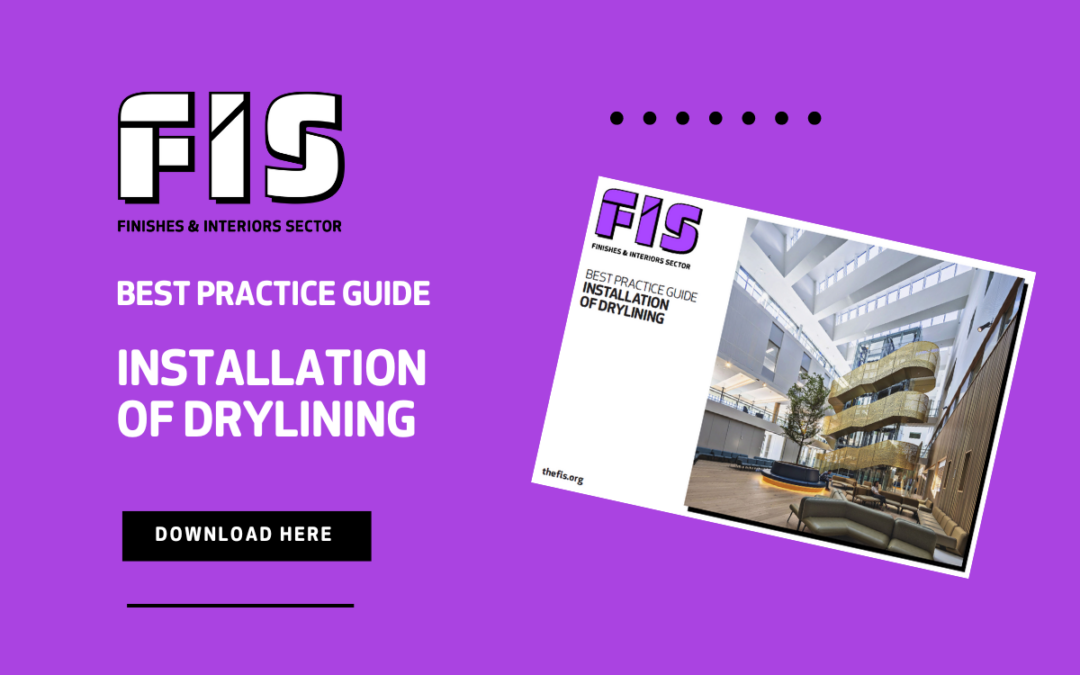
by Clair Mooney | 22 Mar, 2024 | Drylining
FIS has launched a revised and updated Best Practice Guide – Installation of Drylining to help promote best practice in the installation of drylining, and to take account of new working practices, the Building Safety Act and sustainability.
First published in 2015 and updated in 2018, this revised guide is an invaluable aid to specifiers, contractors, clients and installers. This publication will guide them through the design and installation of internal, non-loadbearing drylining constructions using gypsum plasterboard on rigid metal framework. It also includes descriptions of other non-plasterboard, such as calcium silicate board, which are also used in drylined systems. This guide includes drylined partitions, linings and passive fire protection.
Split into sections, the revised guide covers everything from the initial tendering and planning stages through to the eventual installation. It offers a series of points to consider when carrying out the installation of all types of drywall and provides updated and revised information including:
The guide sits alongside other FIS Best Practice Guides that relate to drylining:
Commenting on the drylining guides, Iain McIlwee, FIS Chief Executive said:
“Drylining systems form firewalls, fire escape routes and provide passive internal fire protection so it is incredibly important to get it right at all stages of installation and this has to start far earlier and long before boots hit the ground. Our new and updated guides allow professionals to reduce risks, support compliance and most importantly of all encourage responsible planning.”
A valuable resource for improving works package delivery, these guides work well when they are included in proposals and project plans to demonstrate how to best approach a project.
You can download the Best Practice Guide – Installation of Drylining here.
For further information or for any questions and comments please contact the FIS at info@thefis.org or call 0121-707-0077

by Clair Mooney | 5 Mar, 2024 | Ceilings, Drylining, Employment, Main News Feed, Skills
FIS is looking for members in London to provide support for individuals that have undertaken an introduction course for Interior Systems. The course is taking place in April, so if you can offer a work trial, work experience, or employment then please contact FIS Head of Skills and Training, Beena Nana beenanana@thefis.org before the end of March for more details.
Background
The Skills Centre London are putting together a four-week introduction to Interior Systems in London, in collaboration with FIS and Worshipful Company of Plaisterers.
Individuals will be provided with the following training:
- Green Labourers CSCS card
- Level 1 Award in Health and Safety in a Construction Environment
- Level 1 Certificate in Basic Construction (including Plastering Techniques)
- First Steps into Construction
- Personal Wellbeing in Construction
- Introducing Environmental Awareness and Sustainability
- Practical skills training in our training environment
- Work experience with an interior systems employer
- Employability skills, mock interviews, CV support and career information, advice and guidance
A graduation ceremony will held at Plaisterers Hall on Monday 29 April, for both the candidates and members.
More information on the course is available here.






